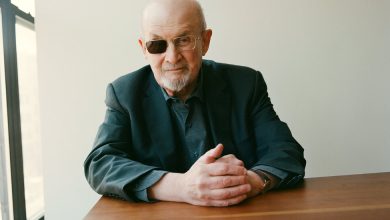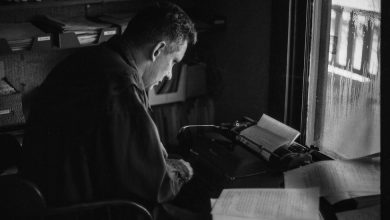Review: Edie Falco Shines as an Everywoman in ‘Morning Sun’

Making the best of the little you’ve got may or may not be the theme of “Morning Sun,” the pianissimo new play by Simon Stephens that opened Off Broadway on Wednesday. But it’s certainly the problem.
Not for Stephens is the big statement. His characters, linked in a maternal chain, are everywomen — or anywomen — positioned equidistantly along a conveyor belt between birth and death. Claudette is the tough one in her 70s, Charley the practical one in her 50s, Tessa the disillusioned one in her 30s. That they are identified by number in the script suggests their merely prototypical status.
But unlike the lettered characters (A, B and C) in Edward Albee’s “Three Tall Women,” of which “Morning Sun” sometimes seems a less glittering variation, 1, 2 and 3 have self-consciously ordinary lives. Instead of Albee’s Park Avenue-ish boudoir, Stephens locates three generations of the McBride family in a rent-controlled walk-up in Greenwich Village. And instead of having chic lawyers and live-in caretakers, the McBrides and their companions have pointedly working-class jobs: a hospital receptionist, a museum guard, a janitor at the Y.M.C.A.
That these three not-so-tall women are played by three excellent stage actors — Blair Brown as Claudette, Edie Falco as Charley, Marin Ireland as Tessa — ensures that their crises come into clear focus. Abuse, affairs, alcoholism and abortion each get a believable turn in Lila Neugebauer’s staging for Manhattan Theater Club. Yet for all the enjoyably detailed work, the play remains stubbornly tiny, as if Stephens, aiming small, overshot.
Certainly the effort to valorize unglamorous lives is worthy. The problem comes from trying to dramatize uneventful ones. It can be done; consider “Waiting for Godot,” a play about nothing happening. But “Morning Sun” highlights neither the existential angst of a meaningless world nor the interpersonal conflicts that make so many fictional homes feel dangerous.
Instead, it illustrates familiar moments on a family timeline: Claudette moves from Nyack to New York City, marries while pregnant but the baby dies; two years later Charley (actually Charlotte) is born, and 30 years later, Tessa. For two of the women, the search for happiness in love is eventually successful — there’s a reason they’re named McBride. And though Claudette tells Charley she’s a failure as a mother and Charley tells Tessa she’s an irresponsible daughter, everyone is reconciled before they die.
“It’s just people, just trying to get through stuff,” Falco said in a New York Times article. “There’s something very beautiful about that.”
Perhaps, but even Stephens seems to find the approach insufficiently muscly for a contemporary play. As a vitamin supplement, he turns to irony and meta-theatrics, having each woman narrate parts of the story as if reading one another’s résumés aloud and annotating them with sass. At times, Brown and Ireland moonlight as ancillary characters — a boyfriend, a lover, a husband, a pal — to thicken the texture.
But these attempts to sketch the women’s lives and the ethos of the eras they live through are unconvincing, laced as they are with hasty anthropology and a whiff of Wikipedia.
So when Claudette gets a job in the haberdashery department at Macys in 1947 or Charley attends a Beatles concert in 1965, the specifics seem paradoxically generic. The skipped-over patches necessitated by the play’s chronological format likewise become little more than name-checks: Leonard Bernstein, AIDS, Valerie Solanas, Sept. 11, Jane Jacobs, poor demolished Penn Station.
Those last two are a tipoff to what Stephens, whose earlier plays “The Curious Incident of the Dog in the Night-Time” and “Heisenberg” were crackling fun, may be up to here. Rather than adding to the catalog of works in which monsters prevail and little lives go unnoticed, Stephens seems to prefer, in “Morning Sun,” to eulogize the loss of a quieter idea of civic life, and also of theater. The New York City he offers — admittedly from afar; he’s British — feels relentlessly sepia, like 1930s social drama but without the social disruption. It’s a place that can be modest about its grandeur, where work is honored and sadness is part of the light.
That Hopperesque quality — “Morning Sun” takes its name from Edward Hopper’s 1952 portrait of a woman staring out a sun-filled window — is the play’s most attractive trait. Neugebauer’s staging doesn’t pick up on it, though; the set, by the design collective called dots, references a painterly spareness but leaves out the beauty part. (It’s just a big, ugly room, less like a fifth-floor walk-up than a basement, with barely any sunlight at all.) And since the women are mostly speaking from different eras, or from some unspecified time beyond time, the home they all occupy comes off less as a real place than as a purgatory.
Under these conditions, a lot is asked of the actors; all three deliver. Brown, in her snappish mode, is wonderfully entertaining, and Ireland brings a sparkly, neurotic wit to the weakest material. (Tessa seems to have been reverse engineered from a list of plot necessities.) But Falco, perhaps because she is the only one who plays no other characters, offers the richest portrait; even if you don’t quite believe in Charley, you believe that she does, and that’s often enough.
Even when it’s not, the play is no disaster, just strangely becalmed and unresponsive. Only rarely can you detect its pulse, let alone the feeling Stephens describes as “the sadness in your chest.” Claudette, speaking for Charley after the end of a relationship, says of that feeling, “What’s odd is there is no reason that you can understand why people should feel sadness or shame in their actual heart, an organ the primary function of which is to maintain the distribution of blood around the body. But you do.”
It’s a beautiful line, but also an unintentional diagnosis. In “Morning Sun” you mostly feel the heartbreak in your head.
Tickets ThroughDec. 19 at Manhattan Theater Club; manhattantheatreclub.com. Running time: 1 hour 40 minutes.





